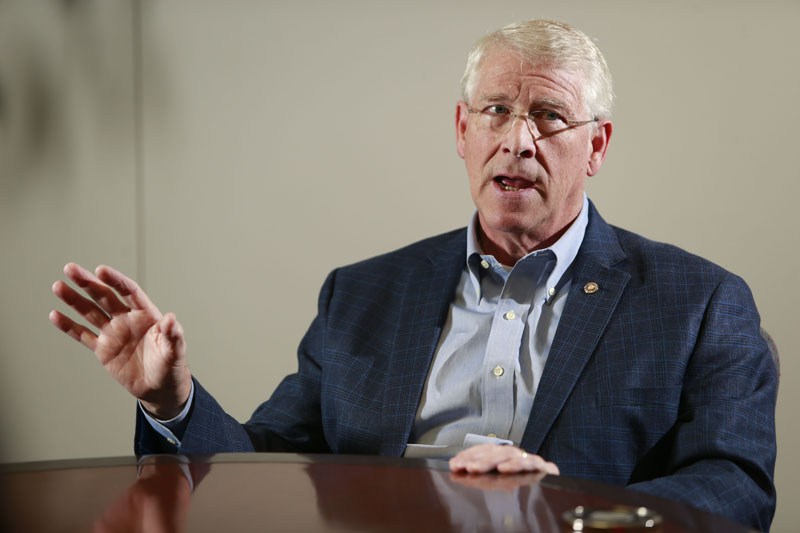US Senator Roger Wicker, co-president of the Influential US Helsinki Commission, in early February caused many reactions when he pointed on extreme corruption among high ranked politicians in Bosnia and Herzegovina in a letter to Secretary of US John Kerry. He requested a punishment for politicians like that and proposed prohibition of entry into the United States of America and the freezing of assest to them, and to those who support them.
Bosnian version you can read here: SENATOR WICKER ZA "AVAZ": Moja najveća briga je sistemska korupcija u Bosni i Hercegovini!
In a recent letter written to secretary of State John Kerry, you emphasized a problem of worsening corruption in Bosnia and Herzegovina, including corruption in vital regulatory institutions and among high-level political officials. Do you have a bit more detailed information on corruption in Bosnia and Herzegovina? Do you personally have any specific knowledge about corrupt activities of some Bosnian politicians and governmental institutions? If so, can you name some of them?
I will leave it to the prosecutors to name individuals based on evidence, the courts to make judgments based on that evidence, and the media to report on the findings of their investigations. The focus of my concern was not only on high-profile cases but also on corruption as a well-known, pervasive, and systemic problem in Bosnia and Herzegovina today. Dealing with corrupt officials is frustrating to citizens trying to organize their lives and find opportunities for the future. It is frustrating to international donors, including the United States, to see how corruption makes assistance less effective than it otherwise might be.
Speaking of corruption, which is, according to many, the biggest issue in the whole country of Bosnia and Herzegovina, what are the ways to exterminate it for good? Is it achievable in nowadays political situation without specific help of international organizations and institutions in Bosnia and Herzegovina?
International organizations and institutions, including the OSCE, can help. So can our bilateral efforts through the U.S. Embassy in Sarajevo. However, it is mostly a question of political willpower within Bosnia and Herzegovina to overcome corrupt practices and ensure respect for the rule of law. Bosnian citizens need to do more to generate this political willpower, by calling for accountability and transparency in all levels of government.
Did you get the response letter from Mr. Obama administration? If so, could you please tell us more about its content?
The Administration has responded and shares my concerns about the corruption in Bosnia and Herzegovina. Support for the protection of whistleblowers as well as the strengthening of judicial institutions across the board are among the initiatives on which the U.S. government is concentrating its efforts. It is clear to me that worsening corruption in the country will only inhibit international investment. The U.S. Embassy in Sarajevo is active in this regard and has my support and encouragement.
The Senate has supported your initiative for creating a $50 million fund for small and medium investments in our region. What do you expect as a result of it? What are the next steps you are going to take when it comes to improving political and economic situation in Bosnia and Herzegovina?
On November 19, 2015, Senator Jeanne Shaheen of New Hampshire and I introduced a piece of legislation known as the Bosnia and Herzegovina-American Enterprise Act. This act would authorize the President to designate a private, nonprofit organization as the Bosnia and Herzegovina-American Enterprise Fund. This fund would promote the private sector, job creation, and the formation of a middle class in Bosnia and Herzegovina. This is an important next step, and by calling for action to address current corruption in Bosnia and Herzegovina, I hope to make it a successful one.
How would you rate the condition in Bosnia and Herzegovina since the Dayton agreement? How big progress did Bosnia and Herzegovina make and what are the main problems that are standing in the way of its faster progress towards Euro Atlantic integrations? Do you think that the positive results of Clinton's administration in Bosnia and Herzegovina, ending of war and reaching Dayton Peace Agreement began to lose its significance? Should American administration renew their interest in Bosnia and Herzegovina and the western Balkan region and in what way?
Progress has been made since Dayton, especially from 1995 to 2005. The transition, however, is not complete. If anything, it has stalled over the last decade.
The Dayton Agreement successfully restored peace and allowed the country to recover. Ethnicity pervades Bosnian politics, and collective privileges for certain groups – Bosniaks, Serbs, and Croats – often trump the individual human rights of the citizen, no matter his or her ethnicity. There are too many layers of government for a country of Bosnia’s size to function well as a true 21st-century democracy.
Current leaders may only see the downside of reform, which would involve losing their power and influence. Until leaders become more accountable to their citizens and to the law, it is difficult to see a meaningful transition resuming. Beyond the issue of combating corruption, institutional reforms could bolster the country’s chances for Euro-Atlantic and European integration. Like combating corruption, this will take political willpower.
Fight against terrorism in the world is one of the priorities for the USA. What do you think about the cooperation with Bosnian government with this problem?
Many people are unaware that one of America’s first counterterrorism missions after 9/11 took place in Bosnia and Herzegovina. Like many countries, Bosnia and Herzegovina is vulnerable to infiltration by radical elements that could spawn terrorist activity. Corruption and the legacy of war contribute to that vulnerability. But it is clear that Bosnian authorities generally recognize the problem and have taken actions to counter it. Cooperation between the United States and Bosnia and Herzegovina on this issue has been good, and I hope that will continue.
